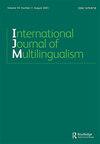难民家庭的动态多语化符合德国欧洲经委会机构的单语语言政策
IF 2
1区 文学
Q2 EDUCATION & EDUCATIONAL RESEARCH
引用次数: 3
摘要
本文章由计算机程序翻译,如有差异,请以英文原文为准。
Dynamic multilingualism of refugee families meets monolingual language policy in German ECE institutions
ABSTRACT Studies on Family Language Policy state that the shape of family multilingualism is embedded in diverse conditions within and outside the family, like historical, social and political factors, which influence family language practices. In this regard, the monolingual orientation of early childhood education (ECE) institutions in many European nation states is in tension with dynamic family multilingualism, thereby constituting a potentially conflict-prone relationship. In this article, we would like to illustrate this with regard to language policy in ECE institutions in Germany, drawing on empirical data from a new teaching research project on Family Language Policy of multilingual, (newly) migrated and/or refugee families. Our analyses reveal that parents are aware of selection in education based on language as well as a hierarchical language order. Family language practices are shaped against the background of the prevailing language policy in ECE institutions.
求助全文
通过发布文献求助,成功后即可免费获取论文全文。
去求助
来源期刊

International Journal of Multilingualism
Multiple-
CiteScore
6.10
自引率
8.70%
发文量
67
期刊介绍:
The aim of the International Journal of Multilingualism (IJM) is to foster, present and spread research focused on psycholinguistic, sociolinguistic and educational aspects of multilingual acquisition and multilingualism. The journal is interdisciplinary and seeks to go beyond bilingualism and second language acquisition by developing the understanding of the specific characteristics of acquiring, processing and using more than two languages. The International Journal of Multilingualism (IJM) provides a forum wherein academics, researchers and practitioners may read and publish high-quality, original and state-of-the-art papers describing theoretical and empirical aspects that can contribute to advance our understanding of multilingualism.Topics of interest to IJM include, but are not limited to the following: early trilingualism, multilingual competence, foreign language learning within bilingual education, multilingual literacy, multilingual identity, metalinguistic awareness in multilinguals, multilingual representations in the mind or language use in multilingual communities. The editors encourage the submission of high quality papers on these areas as well as on other topics relevant to the interest of the International Journal Multilingualism (IJM). Reviews of important, up-to-date, relevant publications and proposals for special issues on relevant topics are also welcome.
 求助内容:
求助内容: 应助结果提醒方式:
应助结果提醒方式:


